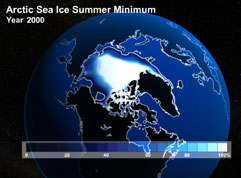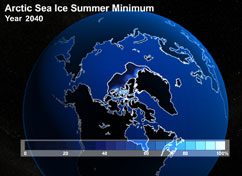Floating sea ice shrinks in the Arctic
Floating sea ice shrinks in the Arctic
mongabay.com
August 10, 2007
By one estimate, the extent of floating sea ice in the Arctic has shrunk more than in any summer ever recorded, reports the New York Times.
Dr. William Chapman, a University of Illinois Urbana-Champaign researcher who tracks Arctic sea ice, said that the combination of natural fluctuations and human-induced climate change and pollution are responsible for the retreat.
While Chapman’s findings differ from those by the National Snow and Ice Data Center (NSIDC) in Boulder, Colorado, NSIDC sea ice expert Mark Serreze said that by September Arctic sea levels will indeed by quite low by historical standards.
The Arctic is particularly sensitive to changes in the extent of sea ice, which helps reflect sunlight back into space, cooling the region. When sea ice melts, the dark areas of open water absorb the sun’s radiation, trigger a positive feedback loop that worsens melting.
  The image from 2000, based on simulations produced by the Community Climate System Model, shows the approximate extent of Arctic sea ice in September. The model indicates the extent of this late-summer ice could begin to retreat abruptly within several decades (top). By about 2040, the Arctic may be nearly devoid of sea ice during the late summer unless greenhouse gas emissions are significantly curtailed (bottom). Courtesy of UCAR. |
“Serreze said that a high-pressure system parked over the Arctic appeared to have caused a ‘triple whammy’ — keeping away clouds, causing winds to carry warm air north and pushing sea ice away from Siberia, exposing huge areas of open water,” according to the New York Times.
Earlier this year Julienne Stroeve of the National Snow and Ice Data Center (NSIDC) and colleagues reported that September sea ice extent retreated at a rate of about 7.8 percent per decade during the 1953-2006 period.
“I’m not terribly optimistic about the future of the ice,” said Serreze in April, after publishing a sea ice paper in the journal Science. “As greenhouse gases continue to rise, the Arctic will continue to lose its ice. You just can’t argue with the physics.”